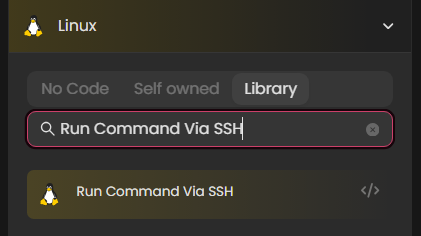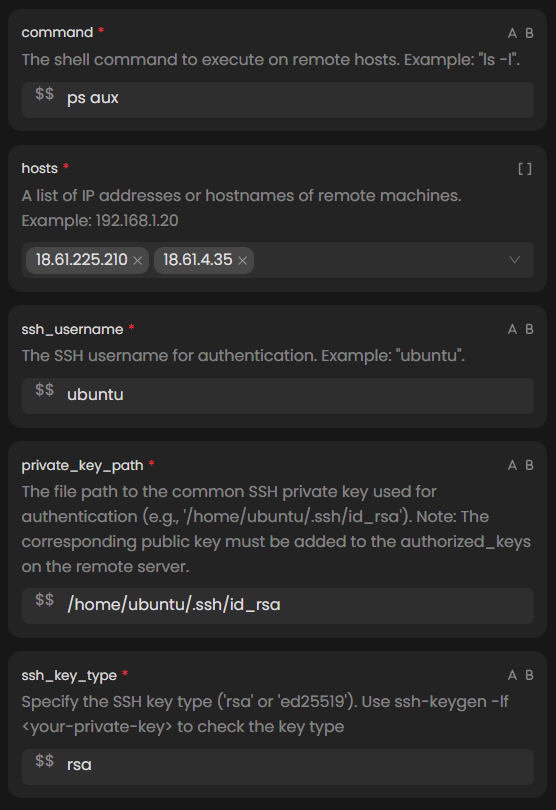Run Command Via SSH
Overview
The Run Command Via SSH action allows users to execute shell commands on remote hosts via SSH from a Linux agent. This enables secure and efficient remote command execution, useful for system administration, automation, and deployment tasks. With this action, you can run commands across multiple remote machines seamlessly within your bot workflow.
Prerequisites
Linux Agent
- Agent Configuration:
Ensure the Linux Agent is properly configured. Refer to the Agent Installation Guide. - SSH Access:
- The remote hosts must have SSH enabled.
- The SSH private key used for authentication must match the corresponding public key added to
~/.ssh/authorized_keyson the remote server. - Ensure that the specified SSH user has the necessary permissions to execute commands on the remote machines.
How to Use This Action?
To use the Run Command Via SSH action, follow these steps:
-
In your bot workflow, go to Linux Actions under the Library section.

-
Search for Run Command Via SSH and drag it into your workflow.
-
Select the Linux integration connected to the agent that will establish the SSH connection.
-
Under the Parameters section, specify the required values for executing the command. Refer to the Parameter Details section for more information.
-
Configure the SSH authentication details:
- Provide the command to run. In this example, we are using
ps aux, which displays a detailed list of all running processes on the system. - Specify the list of target remote hosts.
- Provide the SSH username used for authentication.
- Enter the file path to the private key that corresponds to the remote server's public key.
- Define the SSH key type (RSA or ED25519).

- Provide the command to run. In this example, we are using
-
Save or update the bot, then click on Run to execute the command remotely. The execution details will show success or errors for each target host.
Example Execution Result
json[ { "hostname": "18.61.225.120", "command": "ps aux", "status": "success", "output": [ "USER PID %CPU %MEM VSZ RSS TTY STAT START TIME COMMAND", "root 1 0.2 1.2 166256 11500 ? Ss 04:47 0:01 /sbin/init", "root 2 0.0 0.0 0 0 ? S 04:47 0:00 [kthreadd]", "root 3 0.0 0.0 0 0 ? S 04:47 0:00 [pool_workqueue_release]", "root 4 0.0 0.0 0 0 ? I< 04:47 0:00 [kworker/R-rcu_g]", "root 5 0.0 0.0 0 0 ? I< 04:47 0:00 [kworker/R-rcu_p]", "root 6 0.0 0.0 0 0 ? I< 04:47 0:00 [kworker/R-slub_]", "root 7 0.0 0.0 0 0 ? I< 04:47 0:00 [kworker/R-netns]", "root 9 0.0 0.0 0 0 ? I< 04:47 0:00 [kworker/0:0H-events_highpri]", "root 10 0.0 0.0 0 0 ? I 04:47 0:00 [kworker/0:1-events]", "root 11 0.0 0.0 0 0 ? I 04:47 0:00 [kworker/u4:0-events_unbound]", ], "error": null, "user_id": "", "root_user_id": "", "integration_id": "1b0115fcdc5847028c097ebae2dab4b5", "integration_type": "linux" }, { "hostname": "18.61.4.35", "command": "ps aux", "status": "success", "output": [ "USER PID %CPU %MEM VSZ RSS TTY STAT START TIME COMMAND", "root 1 0.6 1.3 167612 13056 ? Ss 05:13 0:07 /lib/systemd/systemd --system --deserialize 49", "root 2 0.0 0.0 0 0 ? S 05:13 0:00 [kthreadd]", "root 3 0.0 0.0 0 0 ? S 05:13 0:00 [pool_workqueue_release]", "root 4 0.0 0.0 0 0 ? I< 05:13 0:00 [kworker/R-rcu_g]", "root 5 0.0 0.0 0 0 ? I< 05:13 0:00 [kworker/R-rcu_p]", "root 6 0.0 0.0 0 0 ? I< 05:13 0:00 [kworker/R-slub_]", "root 7 0.0 0.0 0 0 ? I< 05:13 0:00 [kworker/R-netns]", "root 9 0.0 0.0 0 0 ? I< 05:13 0:00 [kworker/0:0H-events_highpri]", "root 10 0.0 0.0 0 0 ? I 05:13 0:00 [kworker/0:1-mm_percpu_wq]", "root 12 0.0 0.0 0 0 ? I< 05:13 0:00 [kworker/R-mm_pe]" ], "error": null, "user_id": "", "root_user_id": "", "integration_id": "1b0115fcdc5847028c097ebae2dab4b5", "integration_type": "linux" } ]
Parameter Details
| Parameter | Required | Description |
|---|---|---|
| command | Yes | The shell command to execute on remote hosts. Example: ls -l. |
| hosts | Yes | A list of IP addresses or hostnames of remote machines. Example: 192.168.1.20. |
| ssh_username | Yes | The SSH username for authentication. Example: ubuntu. |
| private_key_path | Yes | The file path to the SSH private key used for authentication (e.g., /home/ubuntu/.ssh/id_rsa). Ensure the corresponding public key is added to the remote server's authorized keys. |
| ssh_key_type | Yes | Specify the SSH key type (rsa or ed25519). Use ssh-keygen -lf <your-private-key> to check the key type. Default is rsa. |
Example Use Case
Scenario: System Update on Multiple Servers
Keeping multiple remote servers up to date is crucial for security, performance, and stability. Manually logging into each server to update packages can be time-consuming and inefficient, especially in large-scale environments.
With Run Command Via SSH, you can automate this process by executing the following command on all target machines:
bashsudo apt-get update && sudo apt-get upgrade -y
This command performs the following actions:
- apt-get update: Fetches the latest package lists from configured repositories to ensure the system has up-to-date package information.
- apt-get upgrade -y: Installs available updates for all packages without requiring manual confirmation.
By leveraging this action, administrators can:
- Ensure all remote servers are updated with the latest security patches and software enhancements.
- Reduce the operational overhead of logging into each machine individually.
- Automate scheduled updates as part of a broader maintenance workflow.
This approach improves efficiency and minimizes the risk of missing critical updates across multiple remote servers.
